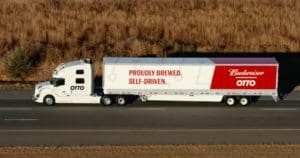 Uber’s development of autonomous trucks has been in the news a lot lately. Unfortunately, it hasn’t been for the reasons the company has hoped. First, there was the lawsuit filed by Google alleging that Anthony Levandowski, one of Otto’s top engineers (and formerly an engineer at Google’s self-driving car venture Waymo) downloaded 14,000 confidential files related to automated vehicle tech and then left the company to found Otto. As a result, Uber fired Levandowsi. However, that is clearly not the end of the lawsuit, and certainly doesn’t paint Uber in a positive light. Just as the dust was settling on this incident, California regulators announced that they will inspect Uber’s autonomous truck unit in San Francisco. This is due to concerns that the company may have been breaking the law by testing its autonomous trucks on public highways. An internal document referenced daily testing of self-driving trucks around San Francisco which contradicts what the company told California officials in February. Trucks weighing more than 10,000 pounds cannot operate autonomously on public roads in California. This is probably one battle that Uber wishes it didn’t have to face.
Uber’s development of autonomous trucks has been in the news a lot lately. Unfortunately, it hasn’t been for the reasons the company has hoped. First, there was the lawsuit filed by Google alleging that Anthony Levandowski, one of Otto’s top engineers (and formerly an engineer at Google’s self-driving car venture Waymo) downloaded 14,000 confidential files related to automated vehicle tech and then left the company to found Otto. As a result, Uber fired Levandowsi. However, that is clearly not the end of the lawsuit, and certainly doesn’t paint Uber in a positive light. Just as the dust was settling on this incident, California regulators announced that they will inspect Uber’s autonomous truck unit in San Francisco. This is due to concerns that the company may have been breaking the law by testing its autonomous trucks on public highways. An internal document referenced daily testing of self-driving trucks around San Francisco which contradicts what the company told California officials in February. Trucks weighing more than 10,000 pounds cannot operate autonomously on public roads in California. This is probably one battle that Uber wishes it didn’t have to face.
And now, on to the news:
- UPS forges China joint venture
- Trump has plans to fix Post Office’s deep losses
- “Shape-shifting” pasta could transform food shipping
- LR classes first shape as “cyber safe”
- Texas poised to be next to allow autonomous testing
- Drones in the news
 UPS is setting up a joint venture in China to haul more US-bound goods. In a statement, UPS announced the joint venture with S.F. Holding Co. to take advantage of the growth of e-commerce in China. Both companies will invest $5 million in the 50-50 joint venture. For UPS, the partnership gives the company access to a network of 13,000 customers, with the initial focus on deliveries going from China to the US. UPS and S.F. Express will provide delivery service to the US with a mix of aircraft and rail- and ocean-freight brokerages. The deal is still pending regulatory approval.
UPS is setting up a joint venture in China to haul more US-bound goods. In a statement, UPS announced the joint venture with S.F. Holding Co. to take advantage of the growth of e-commerce in China. Both companies will invest $5 million in the 50-50 joint venture. For UPS, the partnership gives the company access to a network of 13,000 customers, with the initial focus on deliveries going from China to the US. UPS and S.F. Express will provide delivery service to the US with a mix of aircraft and rail- and ocean-freight brokerages. The deal is still pending regulatory approval.
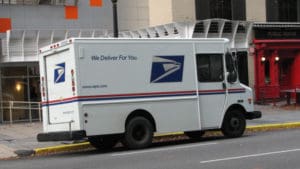 President Trump has set forth a plan to fix the Post Office’s deep losses – cut back on Saturday delivery. In his latest budget proposal, Trump would let the USPS cut back on delivery days, a move that could save the agency more than $45 billion over the next decade. With six-day deliveries, plus Sunday Amazon deliveries, the USPS is losing up to $5 billion annually. This is not the first time a service cut-back has been proposed. In 2013, for example, the USPS tried to scale mail delivery back to five days a week while continuing to deliver packages on Saturdays. This was met with stiff resistance from postal unions and members of Congress. The latest proposal is sure to meet opposition as well.
President Trump has set forth a plan to fix the Post Office’s deep losses – cut back on Saturday delivery. In his latest budget proposal, Trump would let the USPS cut back on delivery days, a move that could save the agency more than $45 billion over the next decade. With six-day deliveries, plus Sunday Amazon deliveries, the USPS is losing up to $5 billion annually. This is not the first time a service cut-back has been proposed. In 2013, for example, the USPS tried to scale mail delivery back to five days a week while continuing to deliver packages on Saturdays. This was met with stiff resistance from postal unions and members of Congress. The latest proposal is sure to meet opposition as well.
 Researchers at MIT may have found a way to drastically reduce the cost of packaging and shipping food – shape shifting. A team from MIT’s Tangible Media Group created flat sheets of gelatin and starch that transform into 3D shapes, such as flowers and pasta forms, when submerged in water. The thought is that the flat sheets can be stacked and packed more efficiently. According to Wen Wang, a co-author of the research, stacking macaroni perfectly still results in 67 percent of the volume as air. Flat stacking sheets of the gelatin could increase the volume significantly.
Researchers at MIT may have found a way to drastically reduce the cost of packaging and shipping food – shape shifting. A team from MIT’s Tangible Media Group created flat sheets of gelatin and starch that transform into 3D shapes, such as flowers and pasta forms, when submerged in water. The thought is that the flat sheets can be stacked and packed more efficiently. According to Wen Wang, a co-author of the research, stacking macaroni perfectly still results in 67 percent of the volume as air. Flat stacking sheets of the gelatin could increase the volume significantly.
 Korean shipyard Hanjin Heavy Industries has delivered three ships which are the first to be classed with Lloyd’s Register’s notations certifying the autonomous systems onboard as safe from human error. With the certification, the operator meant to minimize human error and ensure the ships were safe and efficient when running in autonomous mode. Autonomous systems built by Alpha Ori Technology automate some functions so ships and crew can operate more efficiently. The new ships were built for Global United Gas Carriers, affiliated with Japanese conglomerate Mitsui & Co.
Korean shipyard Hanjin Heavy Industries has delivered three ships which are the first to be classed with Lloyd’s Register’s notations certifying the autonomous systems onboard as safe from human error. With the certification, the operator meant to minimize human error and ensure the ships were safe and efficient when running in autonomous mode. Autonomous systems built by Alpha Ori Technology automate some functions so ships and crew can operate more efficiently. The new ships were built for Global United Gas Carriers, affiliated with Japanese conglomerate Mitsui & Co.
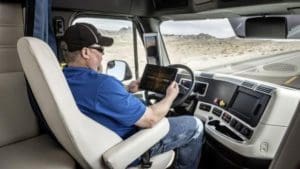 Texas is set to become the next state that will allow testing of fully autonomous vehicles on public roads. The state’s legislature approved a bill creating the basic framework manufacturers will need to follow; once the legislation is signed by Gov. Greg Abbott, it will be law on September 1. Texas has already allowed autonomous truck testing in specific locations. The new legislation is meant to clarify the expectations and liabilities concerning the technology. The bill allows testing fully autonomous vehicles on public roads, provided the vehicle is compliant with all federal laws, is registered in the state, has proper insurance, and includes a data recorder. The legislation does not require a licensed human operator either, but the owner is considered the operator and will be held liable for any incident.
Texas is set to become the next state that will allow testing of fully autonomous vehicles on public roads. The state’s legislature approved a bill creating the basic framework manufacturers will need to follow; once the legislation is signed by Gov. Greg Abbott, it will be law on September 1. Texas has already allowed autonomous truck testing in specific locations. The new legislation is meant to clarify the expectations and liabilities concerning the technology. The bill allows testing fully autonomous vehicles on public roads, provided the vehicle is compliant with all federal laws, is registered in the state, has proper insurance, and includes a data recorder. The legislation does not require a licensed human operator either, but the owner is considered the operator and will be held liable for any incident.
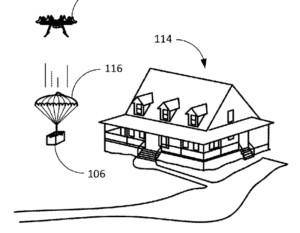 Amazon is pushing forward with more innovations for drone deliveries. The latest patent for the company is for a shipping label that doubles as a parachute for drone deliveries. The parachute is meant to soften the landing for those packages dropper by drones for home delivery. According to the patent, the shipping label looks like an ordinary shipping label but has a system of cords, a parachute, and a breakaway cover underneath. Amazon could also attach multiple parachutes to larger items.
Amazon is pushing forward with more innovations for drone deliveries. The latest patent for the company is for a shipping label that doubles as a parachute for drone deliveries. The parachute is meant to soften the landing for those packages dropper by drones for home delivery. According to the patent, the shipping label looks like an ordinary shipping label but has a system of cords, a parachute, and a breakaway cover underneath. Amazon could also attach multiple parachutes to larger items.
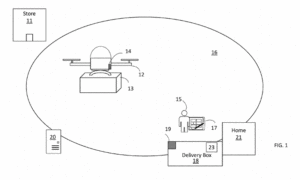 And finally, Walmart has also filed a new patent for drone technology. In its latest filing, the retail giant’s application reveals plans for a drone delivery service that uses blockchain technology to ensure that packages are dropped off in secure locations. Walmart is looking beyond simply delivering goods to a customer’s front door; instead the company is looking at ways to deliver goods to secure boxes that communicate with the drone. The system uses blockchain technology and geofencing for package tracking and identification.
And finally, Walmart has also filed a new patent for drone technology. In its latest filing, the retail giant’s application reveals plans for a drone delivery service that uses blockchain technology to ensure that packages are dropped off in secure locations. Walmart is looking beyond simply delivering goods to a customer’s front door; instead the company is looking at ways to deliver goods to secure boxes that communicate with the drone. The system uses blockchain technology and geofencing for package tracking and identification.
That’s all for this week. Enjoy the weekend and the song of the week, I Fought the Law by the Clash.


















Amazon is preparing to dive into uber-for-trucks world. Well with all their money they can succeed. Still there are a lot of competitors – Doft, CargoX, Uber itself.
Let’s see who wins, but I remember Cargomatic, which became a usual brokerage. Trucking is an industry based on relationship between carriers and brokers. It ain’t gonna be easy to disrupt it with the mobile app. The majority of deals are the result of negotiation, and the apps will not be able to provide this possibility.